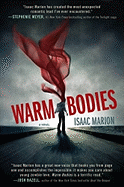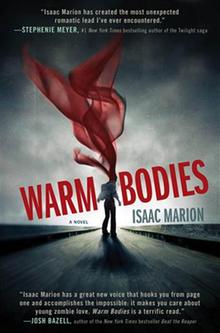
 R is one of many
zombies who have taken up residence in the airport of a large American city;
sometimes, when the power flickers on, he rides the escalators for fun, but
usually there isn't much to do but shuffle aimlessly until it's time to go
wander into town and find some humans to feed on. Although R may not be able to
speak more than a few syllables at a time, and can't remember his whole name,
he has a very active interior life--as evidenced by his eloquent narration--and
his existential frustration only intensifies after he eats the brains of one of
the Living and begins to fall in love with his victim's girlfriend, Julie. And
though she's repulsed at first, Julie soon realizes that R isn't like the other
zombies... or the other men she knows, either. "You're so quiet," she marvels early in their
blossoming relationship. "You just sit there and listen."
R is one of many
zombies who have taken up residence in the airport of a large American city;
sometimes, when the power flickers on, he rides the escalators for fun, but
usually there isn't much to do but shuffle aimlessly until it's time to go
wander into town and find some humans to feed on. Although R may not be able to
speak more than a few syllables at a time, and can't remember his whole name,
he has a very active interior life--as evidenced by his eloquent narration--and
his existential frustration only intensifies after he eats the brains of one of
the Living and begins to fall in love with his victim's girlfriend, Julie. And
though she's repulsed at first, Julie soon realizes that R isn't like the other
zombies... or the other men she knows, either. "You're so quiet," she marvels early in their
blossoming relationship. "You just sit there and listen."
Isaac Marion owes an obvious debt to William Shakespeare (R & Julie, anyone?) but Warm Bodies doesn't belabor the point. You could read the entire novel without realizing what M, the name of R's wise-cracking zombie friend, stands for, and R's efforts to reunite with Julie after their initial separation are so absorbing you almost forget there's a symbolic significance to the balcony scene. (And, ultimately, there's the fact that the ending has been changed to create a more hopeful, optimistic tone.) If Marion leans too hard on any particular crutch, it's the idea that zombies and humans aren't really so different; the "education" scenes designed to show the similarities of their societies are especially heavy-handed. On the other hand, it does lead to the spectacle of zombies fleeing from the undead skeletons that want to destroy them, and that's awfully entertaining.
Marion peppers Warm Bodies with comic touches, like the way the Dead consider "corpse" to be a loaded, derogatory term, but the novel's main theme is completely earnest: just as R is dead on the outside but vibrantly alive on the inside, the young man whose memories flow through him had begun to allow his dreams to die, and equilibrium needs to be restored (not just for the two of them, but for everyone). The story's zombie apocalypse ultimately isn't all that dark or even very scary, but it makes for an entertainingly twisted backdrop for Marion's upbeat message.--Ron Hogan
Shelf Talker: Marion's self-published story "I Am a Zombie Filled with Love" and its subsequent expansion into Warm Bodies led to a film deal even before he sold the book to Atria (and several foreign publishers).

